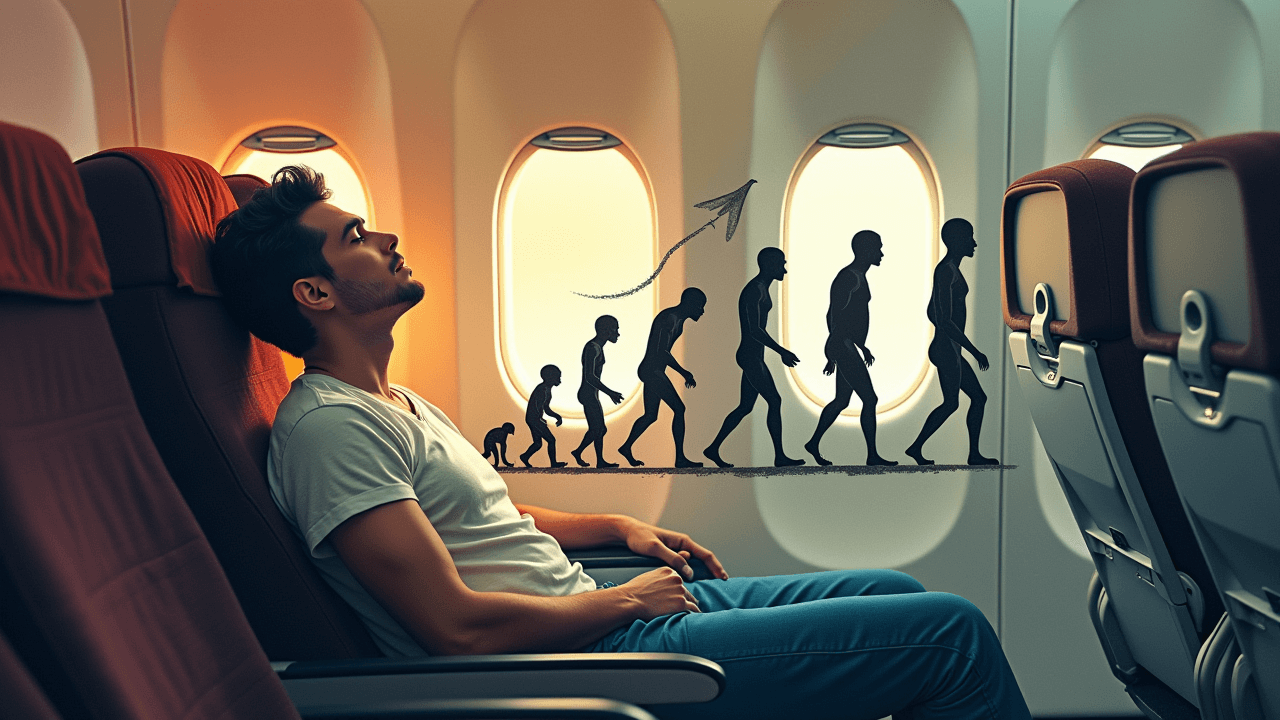Why Haven’t Humans Evolved to Sleep Comfortably Anywhere?
Have you ever found yourself stuck on a plane, trying to nap but waking up with a stiff neck? Or maybe you’ve tried to catch some sleep during your lunch break only to feel more uncomfortable than rested. It begs the question: why haven’t we evolved to sleep comfortably anywhere, especially since sleep is so vital?
It’s something most of us have probably wondered about at some point. After all, we spend so much time in chairs and on the go in our modern world. Why hasn’t evolution helped us out a little bit? Shouldn’t we be able to sleep upright in a chair by now?
Evolution Is a Filter, Not an Engineer
To answer this question, we need to rethink how we understand evolution. One key thing to remember is that evolution is more like a filter than an engineer. It’s not meticulously designing humans to adapt to every situation. Instead, it filters traits based on whether they help us survive and, most importantly, reproduce.
So, while sleeping upright in a chair might feel essential to us, it’s not something that directly impacts our ability to pass on our genes. If something doesn’t affect survival or reproduction, it’s less likely to be passed down as a dominant trait. This means that, sadly, we’re not likely to evolve into expert chair sleepers anytime soon!
Why Did Humans Invent Sitting?
Here’s something surprising: sitting is a relatively new behavior in the grand timeline of human evolution! Our spines were originally designed for walking on all fours, not sitting for long periods. So, when you feel discomfort after sitting for too long or trying to sleep upright, it’s because your body wasn’t really made for that.
Sitting for extended periods is a byproduct of modern life, not something we’ve had enough time to evolve toward. Our bodies just haven’t caught up with the way we live now, and it explains why airplane seats are so uncomfortable, and sleeping while sitting feels unnatural.
Why Variation in Sleep Habits Exists
Even though humans as a whole haven’t evolved to sleep well while sitting, you’ve probably noticed that some people seem to manage just fine. They can fall asleep on a bumpy bus or in a noisy airport terminal. So, what’s up with that?
This brings us to another important evolutionary concept: variation. Within the human species, there’s a wide range of sleep habits. Some people need absolute darkness and silence to fall asleep, while others can sleep through anything. This variation is like a safety net for our species. If we were all perfectly adapted to sleep in only one specific environment, we’d be in trouble if that environment disappeared.
The Role of Randomness in Evolution
Here’s where evolution gets even more interesting. Not all traits are passed down for a specific reason—some of them are the result of pure chance. Random genetic mutations can sometimes give individuals small advantages. Maybe the ability to sleep through noise or in an uncomfortable position is one of those random traits that some people inherit.
It’s a lot like throwing spaghetti at the wall and seeing what sticks. Over time, if certain traits (like sleeping better in less-than-ideal conditions) give individuals an edge, they may become more common in future generations. But because sleep habits don’t play a major role in survival or reproduction, there hasn’t been enough evolutionary pressure for this to become a dominant trait for everyone.
Modern Life and Its Impact on Our Evolution
Now that we’ve covered how evolution and randomness work, it’s fascinating to think about how our modern behaviors might be shaping the future of human evolution. For example, what about all the time we spend staring at screens? Could that be changing our hands or rewiring our brains?
Think about how reliant we are on GPS. Many of us can’t even navigate our neighborhoods without our phones. This could be affecting our spatial reasoning skills in ways we don’t fully understand yet. In the distant future, might humans evolve differently because of our dependence on technology?
There’s no way to know for sure, but it’s possible that today’s habits—whether it’s scrolling through Instagram or napping uncomfortably on a plane—are setting the stage for how humans evolve in the future.
FAQs
Why haven’t humans evolved to sleep comfortably in chairs?
Evolution focuses on traits that affect survival and reproduction. Since sleeping comfortably in chairs doesn’t impact these areas, it hasn’t become a dominant trait.
Is sitting a natural human behavior?
No, sitting for long periods is relatively new in human history. Our bodies were designed for walking on all fours, which is why sitting can feel uncomfortable over time.
Why do some people sleep better in uncomfortable situations?
This variation in sleep habits is part of the natural genetic diversity in humans. Some people may inherit traits that allow them to sleep more easily in less-than-ideal environments.
Can modern behaviors like using phones or GPS affect our evolution?
Yes, over long periods, modern behaviors that give us a survival or reproductive advantage could influence future evolution, although it’s difficult to predict how.
Does evolution have a plan for humans?
No, evolution is a random process with no specific end goal. It’s shaped by survival, reproduction, and chance mutations over long periods of time.
Your Hosts

Alex & Maria
Join Alex Thompson and Maria Davis as they navigate the fascinating world of knowledge. With their combined expertise and passion for learning, they simplify the complex and make every episode a journey worth taking.

